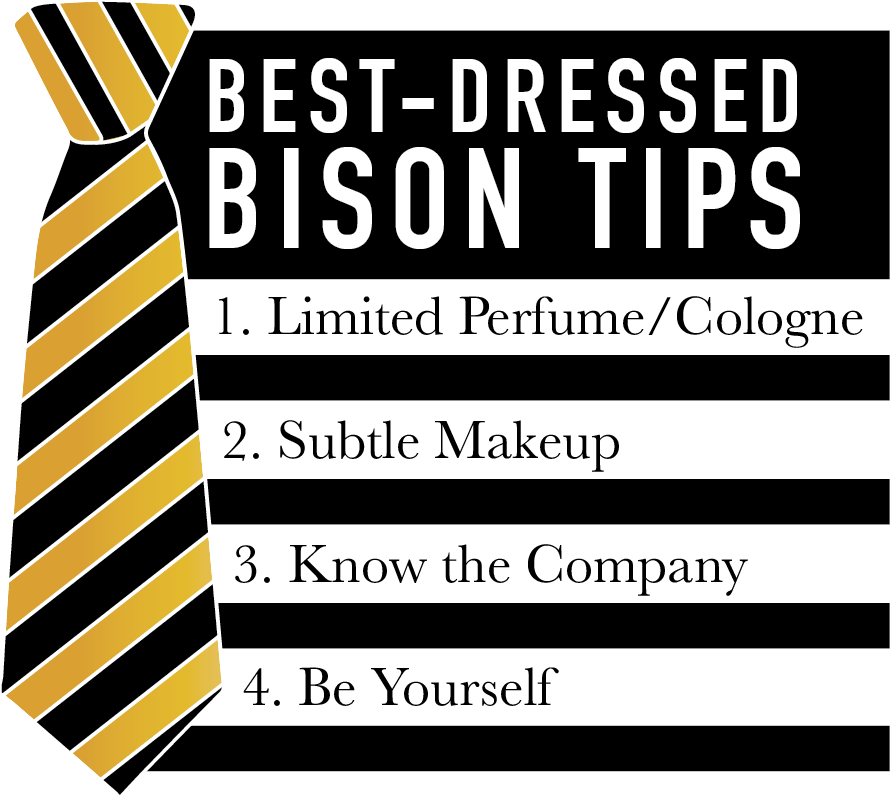Written by Sarah Dixon and Delilah Pope
For many upperclassmen, now is the time to start upgrading their wardrobe from student to professional. Whether you’re preparing for interviews, internships or your first job outside of college, knowing how to dress for success is a crucial skill in the post-graduation “real world.”
For those entering specialized fields, there are often specific dress requirements. Lisa Engel, an associate professor of nursing, offered special insight into what students should expect when entering the healthcare field.
According to Engel, the approved color of scrubs may vary between hospitals and job descriptions, but there are certain standards of dress which translate throughout the field in regards to professionalism, and scrub quality can be a large factor in professional appearance.
“You can get super duper cheap ones at Walmart, but they don’t hold up their shape and look good as long,” Engel said. “And even though students, when they get into nursing, wear hospital scrubs, (they need to have) them look neat and nice and fit properly.”
Engel also stressed the importance of comfort in choosing the right fit of hospital scrubs and advised that floor nurses choose scrubs that will stretch and move while performing patient duties. According to Engel, a student should expect to pay around $40 for a pair of scrubs, but noted that a single pair should last a few years, if rotated properly.
Butch Gardner, director of Career Services, offered similarly cautionary advice students planning to enter the corporate world, as tattoos extreme piercings, as well as perfume and accessories, can potentially distract from the content of an interview.
“You want the total attention of the person doing the interview,” Gardner said, “so those are some things that we tell all the students that come in here for mock interviews. We talk about what to wear and tell them to avoid too much perfume or flashy jewelry or the big huge purses.”
According to Gardner, the expectations of business casual attire will be slacks and a dress shirt or polo, while business professional will incorporate a necktie or a suit jacket, and which is appropriate will depend on the industry and position.
“The standard of dress really does vary with the industry. You’ve got some industry professionals that are a lot more formal than others,” Gardner said. “A classic example is accounting professionals; they’re generally a lot more formal, than, say, IT.”
Gardner noted that for companies with a casual Friday policy, employees are allowed to dress in jeans, but cautioned that T-shirts or torn and tattered clothing are never appropriate.
For facial hair, the rules are much less rigid.
“There’s really not an industry standard for that. There are some professions that are a lot more open to facial hair than others,” Gardner said. “I would advise anyone going into an interview to know the culture and do their research on the industry, the organization, and know what’s acceptable and what’s not.”
public relations major Madeline Jones said that her look has changed over the last four years as she has become more confident in her own style, and it will definitely continue to evolve post-graduation.
“Coming into Harding, I definitely had to cater my style to the typical freshman trying to fit in and follow dress code,” Jones said.
Like Gardner, Jones also stated that one should know what type of dress is expected before going into a new job.
“I would always say err on the side of being more professional at first,” Jones said. “I learned in my senior seminar class that business professionals are less likely to hire somebody who is wearing trendy, bright, flashy things because that’s just not what they’re looking for.”
Senior fashion merchandising major Lauren Pryor has spent a lot of time analyzing clothing choices over the past four years and knows how important it is to be aware of what employers expect.
“With each major, your interview outfit will be different,” Pryor said. “For instance, with mine it’s good to show your style and personality through what you wear to your interview.”
Pryor suggested that students shopping in the Searcy area should look at the business attire at JCPenney, checking out the sales racks first. She also said it could be helpful to simply ask during your interview what kind of dress they are looking for.
“Always be sure to ask beforehand,” Pryor said. “So then you can start collecting things for if or when you get the job, and you can already have things to wear.”
Overall, our clothes say a lot about who we are and what we do, and establishing a great first impression by dressing like a boss can make all the difference.
